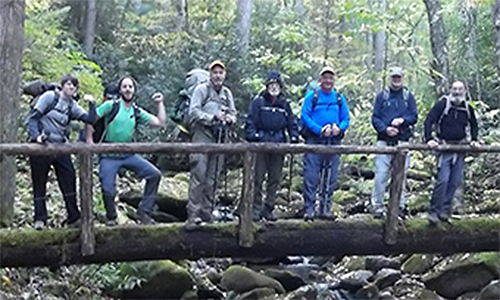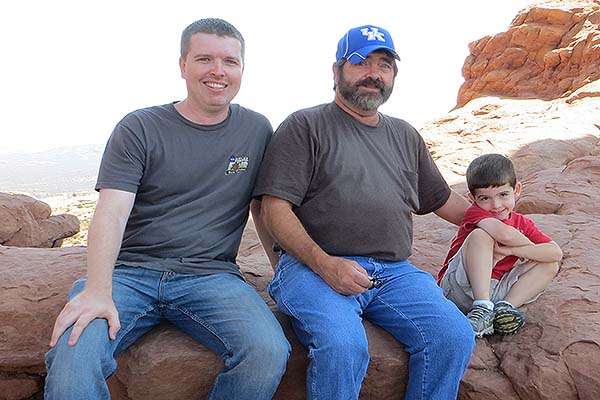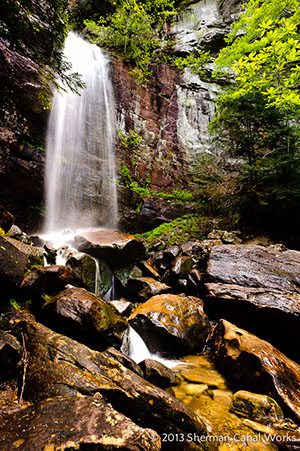Posts Tagged ‘appalachia’
Charlie Jackson: Bringing Farms to Market
By Peter Boucher Charlie Jackson found a simple answer to the complex problems of regional agriculture. He founded the Appalachian Sustainable Agriculture Project in 1995 to create new markets for mountain farmers who had lost their cash crop. Tobacco had sustained farms for nearly half a century, but in the late ‘90s, farms were rapidly…
Read MoreThousand Cankers Disease Hits East Tennessee
By Meredith Warfield Black walnut trees are dying in Morgan and Rhea counties of eastern Tennessee. The culprit, according to a Tennessee Department of Agriculture announcement made this November, is Thousand Cankers Disease. The disease is a recent phenomenon in the East, but has been wreaking havoc in the western United States for the past…
Read MoreGood Ole Rocky Top: Trail Repair in the Smokies
By Davis Wax Leaving I-40 South near Newport, Tenn., heading down Cosby Highway, I slowed down and leaned forward over the steering wheel, watching as the late September sky disappeared behind undulations of green and blue earth. The Great Smoky Mountains loomed ahead, as did my next adventure on the Appalachian Trail, a footpath —…
Read MoreOn the Right Side of the Law
By Molly Moore From the gallery of the Kentucky State Capitol, lawyer Wes Addington and a group of women from eastern Kentucky — mostly widows of coal miners — watched the Kentucky House pass a bill expanding legal and safety protections for state miners. The women had advocated tirelessly in support of the law, and…
Read MoreAppalachia’s Contested History
By Bill Kovarik It has been 50 years since Harry Caudill wrote “Night Comes to the Cumberlands,” a landmark history that rejected stereotypes of Appalachian people as backward hillbillies and described the ruthless exploitation they suffered. The book spoke with eloquence to the American conscience and set off a firestorm of controversy. Within a year,…
Read MoreTraditions of Resistance:
Lessons from the struggle for justice in Appalachia By Molly Moore In 1964, a 61-year-old Kentucky woman, Ollie “Widow” Combs, sat in front of a bulldozer to halt the strip-mining of the steep land above her home. She spent that Thanksgiving in jail, and a photograph of Combs being hauled away landed on major papers…
Read MoreA Waterfall and a View at Bad Branch State Nature Preserve
By Dana Kuhnline Bad Branch Falls near Whitesburg, Ky., was one of the first hikes I experienced when I moved to Appalachia almost 10 years ago. I happened to be chaperoning two vans full of at-risk teenagers on a weekend trip from West Virginia to Whitesburg. The last stop before heading home was this hike.…
Read MoreWorkers Exposed to Toxins at Kingston Ash Spill Cleanup
By Kimber Ray A federal lawsuit alleges that Jacobs Engineering Group knowingly exposed workers to toxic substances during cleanup of the 2008 coal fly ash spill at the Tennessee Valley Authority’s Kingston Fossil Plant in Harriman, Tenn. The lawsuit, filed Aug. 22, claims Jacobs Engineering deliberately misrepresented the health hazards of fly ash, failed to…
Read MoreProgress on Black Lung Prevention
By Kimber Ray After over three years of delay, a proposal for stricter coal dust standards appears to be moving forward. The U.S. Mine Safety and Health Administration has submitted a final draft of its rules to the Office of Management and Budget for review. This development followed a letter sent by Senator Jay Rockefeller…
Read MoreCourt Rules to Protect Virginia Rivers and Streams from Mining Pollution: A & G Coal to be Held Responsible for Unpermitted Discharges of Toxic Selenium
Contact: Matt Hepler, SAMS, 276-565-6167, mhepler24@gmail.com Kim Teplitzky, Sierra Club, 412-802-6161, kim.teplitzky@sierraclub.org Erin Savage, Appalachian Voices, 828-262-1500, erin@appvoices.org Appalachia, Va. – The U.S. District Court for the Western District of Virginia ruled Monday that A & G Coal is responsible for discharging toxic selenium from their Kelly Branch mine into nearby Callahan Creek. The Court…
Read More



